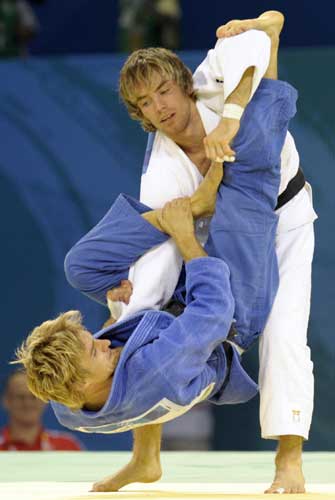Judo: Sport that aims to save kids from guns and knives
New campaign hopes to unearth inner-city talent and atone for Olympic failure

The Japanese, who invented the art of throwing someone else's weight around, may call it "the gentle way", but here in Britain those who run judo reckon it can tempt the hoodies and hooligans into channelling their nastiness into legitimate aggression. Better to inflict a supervised stranglehold than a stab in the chest or a bullet in the head.
What's more, the British Judo Association believe there may be a future Olympic champion or two currently running amok with guns or knives who can be prised from the streets and persuaded that judo provides a pathway to the respect they crave. Which is why part of the £10.2 million that judo has received from Sport England for grass-roots development over the next four years (an increase of almost £3m) will be used to launch a programme which the BJA believe can help bring down levels of inner-city street crime and possibly unearth fresh talent as well.
"We feel that judo is an ideal urban sport which addresses a lot of the issues facing our inner-city kids," says Scott McCarthy, chief executive of the BJA. "It is a phenomenal sport for discipline and building self-respect and respect for others.
"As it happens, the London area is about our weakest in terms of participation. As there are 37 clubs and 1,300 licence-holders [there], this is a bit of an anomaly. We are putting together a plan to go in there and reorganise the whole thing, forming partnerships with different boroughs, aiming to make judo the number one inner-city sport. The Sport England money gives us a great opportunity to do this. We hope to add clubs in areas where we are lacking and attackthe schools through the clubs.
"We do a lot of work on what we call our 'schools to dojo' programme, basically giving the kids taster sessions then signposting them to their local clubs. We have eight full-time coaches in the schools, but at the end of the day you have to get the kids into the club network, and we need to be very aggressive about this."
The American-born McCarthy believes that some of the youngsters involved in violent crime can be persuaded to translate their energies into judo. "Our chairman, Densign White, has had a meeting with the [London] Mayor's office to see what we can do to address some of these issues. We have countless examples of inner-city kids who have been in trouble all week but on the judo mat are little angels. The transformation is incredible. There are some rough kids playing judo, but not one ofthem disrespects an opponent or argues with the referee. The discipline is fantastic.
"I think kids these days really need to learn how to be constructively physical. Years ago, they used to grow up wrestling with each other, but they don't do that any more. They are wrapped up in cotton wool, and by the time they get to their teenage years they get involved with things they shouldn't. Contact sports like judo and boxing give the perfect opportunity to test yourself in a variety of different ways, all of them constructive."
At elite level, British judo found itself on the mat after the failure for a second straight Olympics of its leading hope, Craig Fallon, to win a medal. The sport has won only one in the past three Games, and in the past 36 years there have been seven silver and nine bronze medals, but never gold. It was hoped the 25-year-old bantamweight from Wolverhampton, the former world and European champion, would end the drought, but he and six team-mates came away empty-handed.
Now, after an administrative and coaching shake-up, judo could be on the brink of a revolution under a new head coach, the cerebral Patrick Roux, an Arsène Wenger-type theorist formerly in charge of the French team. "He is just the man to ramp the sport up to a higher level," says McCarthy.
Judo is also following the productive strategy of other sports such as cycling, boxing and rowing by movingto a new, centralised training centre, at Dartford in Kent. "We will rebuild the system from there. I think the problem with judo's lack of success recently has been that we've been resting on our laurels after those good runs in earlier Olympics. We just don't seem to have that fifth gear we need.
"We've always relied on pockets of excellence to deliver Olympic medals and we really need to take the next step and have really good pathways and structures, to put our best players with the best coaches and training partners, develop fresh talent and harden ourselves up to match emerging nations from Eastern Europe."
In other words, become mean street-smart. "This is a sport with tremendous potential but we have slipped and haven't delivered," says McCarthy. "Now we're going to get the job done."
Join our commenting forum
Join thought-provoking conversations, follow other Independent readers and see their replies
Comments
Bookmark popover
Removed from bookmarks